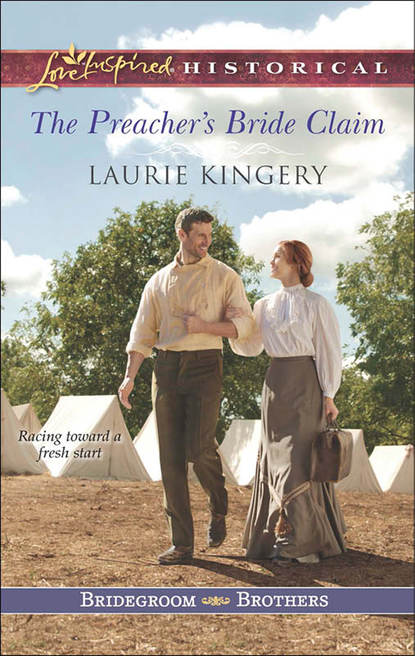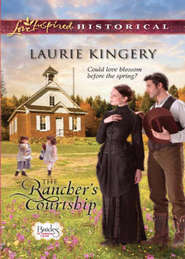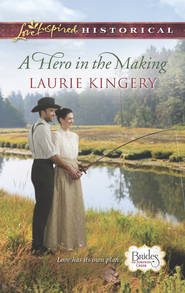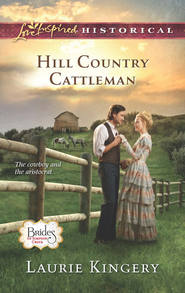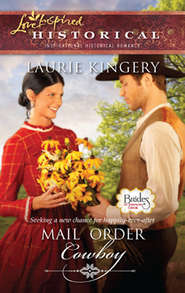По всем вопросам обращайтесь на: info@litportal.ru
(©) 2003-2024.
✖
The Preacher's Bride Claim
Настройки чтения
Размер шрифта
Высота строк
Поля
Alice Hawthorne sat down quietly on an empty bench in the back of the tent church. She’d waited until the little congregation was absorbed in singing “Shall We Gather at the River?” so she could steal in unnoticed. There was a family of six on the long bench ahead of her, but none of them paid any attention to her arrival—except for the shortest of the four stair-step boys. He looked over his shoulder at her, his face full of freckles, a cowlick at the back of his shaggy thatch of hair. When he noticed Alice was watching, he gave her a cheerful, gap-toothed grin. Despite the anxiety constricting her heart like a coiled snake, it was such a comical sight that she couldn’t help but smile back.
“You turn around this instant, Otis Beauregard LeMaster,” his mother hissed at him, without looking to see what or who had distracted her youngest. The boy obediently did so, and Alice was once again alone.
That suited Alice just fine. She hoped to continue to be overlooked among the inhabitants of the tent city as much as possible until the day of the Land Rush, after she had claimed her own 160-acre homestead. Her own and her mother’s, she reminded herself.
It was the first of April. Just twenty-one days until the Unassigned Lands—the lands not claimed by one of the many Indian tribes that now called the Oklahoma Territory home—were opened for settlement by the Indian Appropriations Act signed by President Cleveland. His successor, Benjamin Harrison, had designated noon on April 22 as the moment the settlers could rush in, plant their stakes at the claims of their choice and become real homesteaders.
She’d be safe then, wouldn’t she?
He shall cover thee with his feathers, and under his wings shalt thou trust... She remembered the verse from childhood, and it comforted her now when she felt like a terrified little bird fleeing from a hunter. Her fear was the reason she had come to the chapel service, to be reminded of God’s love and protection.
As the hymn ended, so did her comfortable solitude. With a rustle of skirts, two women plopped themselves down to her left. Alice kept her gaze aimed at the front and hoped they would leave her alone. She had not been an unsociable person before she’d fled New York, but now, she feared each introduction.
The woman next to her didn’t take the hint. “Hey, you’re new here, ain’t ya?” she asked, smiling in a friendly fashion, which revealed incisors that would have done a jackrabbit proud. “Don’t believe we’ve met before. I’m Carrie Ferguson, and this here’s my sister, Cordelia.”
If she hadn’t said they were sisters, Alice would have guessed it, for the two women at her left were so similar-looking with their sun-weathered long faces, noses so sharp they could slice cheese, the same teeth.
“N-nice to meet you,” Alice managed to say. “I’m—” She thought about using an assumed name, but how could she lie—especially in a church, even one of canvas? “I’m Alice Hawthorne.” Hopefully the two women would forget the name—easy to do in a temporary city populated by hundreds of people, with more coming every day.
“Been in Boomer Town long?” Cordelia asked.
If only the service would start, Alice fretted. She didn’t want to answer a bunch of questions. But now that the hymn had concluded, the tall man who may be the preacher was talking to a middle-aged couple up front, and he seemed to be in no hurry.
Alice managed a small smile. “Just since yesterday.”
“Where ya from? We hail from St. Louis.”
“B-back East,” Alice said and prayed they would let it go at that. She wasn’t looking to make friends. Each person she gave her name to was one more person who could help Maxwell Peterson find her. And if he did, it would mean the end of her dreams.
* * *
“Looks like you’ve tripled attendance in the week you’ve been here, Reverend,” Keith Gilbert, his deacon, exulted as he nodded toward the nearly full benches. “You must be doing something right.”
“It’s the Lord’s doing,” he told Keith. “I have such plans for the church we’ll build in the territory. I hope many of the folks here will be able to settle near us.”
“Well, we’re certainly planning to stake a claim near enough to help you build it, once you decide which way you’ll head,” Keith said, and added, “Lord willing.”
“Glad to hear it, Keith,” Elijah murmured. “I’m counting on your help.”
Only one thing marred Elijah’s joy in the growth of his congregation—his brothers weren’t here. Wanting a fresh start as much as Elijah did, they had come to Oklahoma with him, but they wouldn’t attend his chapel services. His middle-born brother, Gideon, wanted nothing more to do with God after he’d lost his wife and child in the influenza epidemic of ’87, and since Elijah had also lost his fiancée, Marybelle Atkins, Gideon couldn’t understand why Elijah didn’t feel the same. Clint, the youngest of the brothers and still a bachelor, was at odds with the Lord, too, after so many losses of friends and family.
My brothers should be here, Elijah thought, with that old familiar ache. Lord, please draw them back to You.
“The Lord has blessed our work,” he told the Gilberts. “Or perhaps folks come to the chapel because they need divine reassurance at this time of such big changes in their lives.”
The Gilberts nodded in approving agreement, but Elijah knew Gideon would have said something. Like maybe they think the more they show up here in chapel, the more likely the Lord will grant them the 160-acre claim of their choice. Or they don’t have anything else to do while they wait to claim their land.
Perhaps it was presumptuous to call the big tent that sheltered them from the blistering sun and spring rains a chapel—much less a church—but for now it was all the church they had, and Elijah was grateful for it. Hadn’t the Hebrews worshipped God in the open desert air, all those years they wandered in the wilderness?
He was about to greet the congregation when Mr. Gilbert said, “Did you see the pretty lady sitting in the back? The one in the dark bonnet? She came in during the hymn. Can’t remember seeing her before.”
Elijah followed the direction of Gilbert’s nod. Elijah couldn’t see the woman’s face at the moment, because her head was bowed and the bonnet she wore hid her features, but as if she had felt the scrutiny, she raised her head just then. He saw sky-blue eyes set in a heart-shaped face with a peaches-and-cream quality to it—she must be scrupulous about wearing a hat under the hot western sun. Her hair, what little of it he could see, was auburn. Her petite frame was clothed in serviceable calico.
Her blue eyes looked troubled, and he wondered why. Who is she? He thought he’d met everyone who came to his daily services, if not all the inhabitants of this tent city. But newcomers were arriving daily in anticipation of the Land Rush, so she must be a new arrival. He’d have to make it a point to introduce himself after the service, in case she was in need of assistance, as a woman alone very well might be. As the pastor of the freshly sprung-up encampment, his ministry consisted of helping the would-be homesteaders with their needs as much as it did with preaching. He was merely doing his duty.
Of course, she might not be alone after all, he reminded himself. Her husband might be buying supplies at one of the tent stores that had sprouted like weeds after a good rain. Or perhaps he was dealing with livestock or, like his brothers, was not a believer.
“Yessir, she sure is a pretty gal,” Keith murmured, as if afraid Elijah wouldn’t see that for himself.
Elijah wondered what Mrs. Gilbert must think of her husband noticing other ladies, but when Elijah darted a glance at her, Cassie was still smiling.
“We thought we should point her out to ya, Reverend,” she said with a wink. “It isn’t good for a man to be alone. You ought to go meet her, after the service.”
Elijah sighed. At least they hadn’t spoken loud enough for any of the other worshippers to hear. “The Lord calls some of us to singleness,” he said. “I am one of them.”
Neither of the Gilberts looked convinced, but he was thankful when they didn’t press him on the point. He hadn’t told anyone in the tent city about his lost fiancée, nor did he intend to. And in any case, there was no time to converse further.
He stepped to the makeshift pulpit someone had fashioned out of a long crate with a rectangular board nailed across the top to form a flat surface on which to lay his Bible.
“Good morning, congregation,” he said, “and welcome, those of you who are new, to Boomer Town Chapel. I’m Elijah Thornton, and I’m glad you’re here. I hope you gain encouragement from being among believers.” He paused and looked around at the various members of his little flock, trying not to let his gaze stray to the back again. “I’d like to open our worship with a word of prayer.”
He prayed that the Lord would bless them on this Monday. Three weeks from this day, they would race into the newly opened territory, each in hopes of claiming a homestead. He asked God to supply all their needs, physical and spiritual, to keep them free of greed and to remember to put others ahead of themselves—a tall order, he admitted, when they would soon be competing with one another for the best plots of land.
After his “Amen” had been echoed by those sitting on the benches, he raised his head and said, “While Mr. Gilbert leads us in ‘Beneath the Cross of Jesus,’ I’m going to ask his good wife to pass the collection sack. Now, no one here is wealthy, or I imagine you wouldn’t be with us seeking free land from the United States government.”
There was a chorus of answering chuckles from several of the flock, and even another “Amen” or two.
“So I don’t want anyone to feel obligated to put anything in,” Elijah continued. “But if you can spare a few pennies or a couple of bits, it will enable us to carry on the work of helping the sick and the needy among us.”
It always humbled him to see how many dropped some coin or other into the drawstring sack as it passed from hand to hand down one row and up another. Apparently lack of wealth was no barrier to generous hearts.
Cassie Gilbert returned with the sack and sat down.
“Those of you who have been attending daily know that I save my sermons for Sundays,” he announced. “Instead, on weekdays, we’ve been praying for each other, knowing that wherever two or more are gathered in His name, the Lord is there, listening and wanting to satisfy our needs, and that the job of the church body is to build each other up.”
“Amen,” said the deacon.
“Are there any prayer requests? Let’s hear them, and then we’ll take our petitions to the heavenly throne, knowing He will answer us according to His will.”
A tall, rawboned man with the droopy face of an old hound unfolded himself from the bench, his hat in his hands. “Reverend, I’d be obliged iffen you’d pray for my wife. She’s feelin’ poorly. The trip here was mighty hard on her.”
“We’ll do that, Asa,” Elijah promised. “I’ll come visit, too.”
“Thank ya, Reverend. She’d like that.”
A woman midway back stood then, her face creased with worry. “My son Billy slipped away over the line this morning. Left us a note sayin’ he was going to stake us a claim while the pickin’ was good. I’m so worried the federals are gonna catch ’im and kick ’im out for bein’ a ‘Too-Sooner,’ and penalize the whole family for what he done.”
Like everyone, Elijah knew the law dealt seriously with the “Too-Sooners,” or just “Sooners” as they were called—those who sneaked over the line and thought to hide out on their claims till the opening shot, then hold their lands against all comers. Unlike the “Boomers,” who were those living in the tent cities, waiting obediently for noon on April 22.





